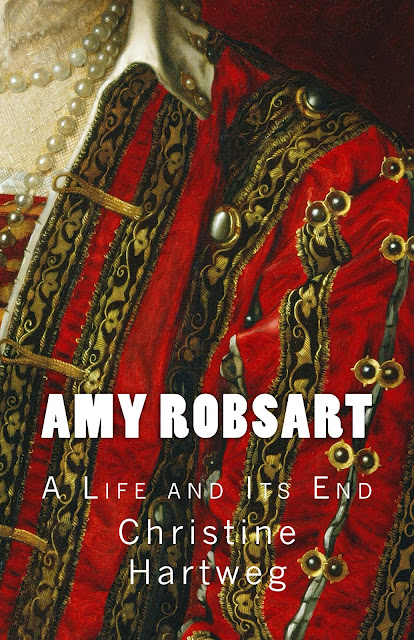The Dudley family with Christine Hartweg
The Dudley family with Christine Hartweg
Firstly, could you please tell us a bit about yourself first?
Jessica, thanks for having me!
My name is Christine Hartweg, and I was born in South America and live in Berlin. I ran the blog www.allthingsrobertdudley.wordpress.com and wrote two books on the Dudleys. John Dudley: The Life of Lady Jane Grey's Father-in-Law and, Amy Robsart: A Life and Its End. I am currently working on Robert Dudley, Earl of Leicester. I have been doing this for quite some time now, especially sifting through sources, but I have restarted the writing recently, so there will be a book. I so love the writing part!
Where did your interest first begin in history?
When I was a child, my parents took me on holidays, and we travelled to Sweden, Lago di Garda (Northern Italy), and St. Petersburg (which was then Leningrad); these were all enchanting places which sparked an interest in history. When I was fifteen, we travelled to England, which gave me a strong interest in English history. At Hampton Court, I bought a Pitkin guide about the Six Wives of Henry VIII, which I still have.
Your blog focuses on the Dudley family. What was appealing about them to write about?
I had developed an interest in the Tudor courtier families, and from there, the Dudleys came naturally. The Dudleys didn't have a good press over the centuries, and even in the 20th century, they were variously labelled as demonic, lightweight, traitorous, or plain stupid. From reading their letters, I could not relate to these descriptions at all, and I became fascinated. When I started the blog in 2011, I had been researching them for three years, already obsessing.
Could you give us a background on the Dudley family? And who Robert Dudley was?
One of the most fascinating things about the Dudleys is that they rose and fell and rose again over four generations. Their story spans the whole 16th century and the first part of the 17th century (in the person of Robert Dudley's illegitimate son, also named Robert Dudley). It all started with Edmund Dudley, and he was the grandson of one of the 15th-century Barons of Dudley Castle. Edmund was highly successful in the service of Henry VII, the first Tudor king, but was imprisoned and executed soon after the accession of Henry VIII.
His eldest son was John Dudley (later Earl of Warwick and the somewhat notorious Duke of Northumberland), who grew up in the household of his future wife, Jane Guildford. Jane became the mother of 13 children, one of them was Robert Dudley, and he was the fourth son to reach adulthood. The fifth son was Guildford, who married Lady Jane Grey, the Nine Days Queen, like his wife, who was executed in 1554 after Wyatt's Rebellion. When Elizabeth I acceded the throne in 1558, just four of the 13 Dudley children were still around: Ambrose, Robert, Mary, and Katherine. Mary had married the courtier Henry Sidney, Katherine the Earl of Huntingdon.
Robert was thus not the eldest surviving son; this was Ambrose Dudley, who received back his father's earldom of Warwick in 1561. The significance of Robert Dudley in Tudor England, and I would say, in world history, comes entirely from his close and strange relationship with Queen Elizabeth. Robert Dudley, from 1564 was the Earl of Leicester and had started his career at the court of Edward VI, where his father managed to become the power behind the throne. After Edward VI's untimely death at age 15, John Dudley, Duke of Northumberland, endeavoured to place his daughter-in-law Jane on the English throne to thwart the succession of the Catholic Mary. He failed, and John like his father 43 years earlier, was beheaded on Tower Hill. Robert and his four brothers were imprisoned in the Tower but were ultimately pardoned in early 1555. At the court of Elizabeth I, Robert became a figure who was always there; for many years, he hoped to marry the Queen, but then he was always her friend, her companion.
When did you first discover the Dudleys?
I came to Robert Dudley via Elizabeth I, unsurprisingly. This was in the late 1990s. I was reading the 1930s biography by John E. Neale (I didn't have any other), and I was deeply moved by the relationship between Elizabeth and Robert. From that time, I was highly interested in Robert. I became aware of John Dudley quite independently from this, although about the same time. Reading the book by Hester Chapman about Lady Jane Grey (1960s), John Dudley, Duke of Northumberland, figured prominently; Chapman quoted some of his letters, and I found John irresistible.
When did Robert first meet Elizabeth I?
They must have met at the court of Henry VIII. Robert said they had known each other since Elizabeth was eight years old.
How did Robert become so influential in the court of Elizabeth I?
Robert's exceptional career was entirely due to Elizabeth's favour. This became clear very soon after her accession. It appeared that Elizabeth was in love with Robert, which was the chief cause of his rise. However, they were also old friends; the Spanish envoy recognized this even before Queen Mary's death, and at the time, Elizabeth was laying the ground for her successful takeover of the realm. Also, Elizabeth clearly had a penchant for the Dudleys, generally. Robert's sister Mary was a favourite lady-in-waiting in her own right, and Elizabeth also liked his brother Ambrose.
Do you think there was a real connection between Elizabeth and Robert?
I think no one has ever disputed this, and all the ambassadors, for example, noticed that there was a very close relationship between them, from 1559 at the latest; as noted, Philip II's agent before Elizabeth's accession wrote that Robert would belong to her inner circle of confidants. Intriguingly, Philip, a couple of years later, observed that Elizabeth had “always been in love with Robert”.
What was the marriage like between Robert and his first wife, Amy?
They appear to have been a perfectly normal couple of the nobility, except they had no children. Amy was a great lady, but the picture we have of her as the country bumpkin or the abandoned wife is wrong. This really only originated with Walter Scott, with the novel Kenilworth. Their signatures appear under business transactions, and Amy could spend her own money from her inheritance. She lived in some style.
Was it a love match? William Cecil claimed it was, and we should take him seriously, although it was in his interest to stress the point, and he may have exaggerated a bit. Amy and Robert were both very young when they married, almost exactly 18. Amy and Robert were born in the same month in the same year, 1532. There are two extant letters written by Amy; one of them clearly shows that she loved her husband. Robert was shocked about her death; this appears in his letters to William Cecil and his agent Thomas Blount.
What positions did Robert hold in court?
Robert started as Master of the Horse, which was one of the bigger court offices. Robert was responsible for the well-being of the queen's horses and had to organize the logistics of the court's movements. Robert was thus also the only male person to be allowed to touch the Queen (when she mounted or dismounted her horse). In the 1580s, Robert was officially made Lord Steward as he was the head of the “below stairs” department of the royal household. Robert supervised the officials who managed the day-to-day provision of food and the more menial tasks. There was also a lot of money involved; for example, Robert's father-in-law, Sir Francis Knollys, was accountable to Lord Steward for his doings as the Comptroller of the royal household.
How much influence did Robert have over Elizabeth?
Robert did have a hold on her; however, he hardly had the amount of political influence over her that some of her enemies claimed. Elizabeth didn't easily share her political power with anyone. Still, Robert did hold a lot of influence in personal and emotional matters with Elizabeth. There are many instances of this.
Did Robert make many enemies?
Well, of course. He was her favourite, but some people believed he was unworthy of the Queen's friendship, that he shouldn't have any place at court at all, that he and all his family were traitors, etc. Also, Elizabeth was expected to marry; when she didn't, there had to be someone to blame. It couldn't be accepted that Elizabeth had decided that she wouldn't marry or, that she would only ever marry of her own choosing. Robert was widely blamed for her non-marriage from quite early in her reign, this continued until his death when she was well past the age of childbearing. He was blamed by the English people as well as some of the courtiers and noblemen who should have known better.
Another point was religion. Robert became a pronounced Protestant with the years, and as the religious divide grew, the Catholics blamed him. There developed a whole literature of pamphlets around him, and the best known is 'Leicester's Commonwealth', an extremely hostile screed which was also very influential in later centuries, supplying some of the better-known anecdotes about the Dudleys. For example, the claim that Amy Robsart “had the chance to fall from a pair of stairs and so to break her neck, but without hurting of her hood that stood upon her neck” appears only 24 years after she died in 'Leicester's Commonwealth'. Nonetheless, it gets repeated over and over again.
Do you think Robert played any part in Amy Rosbart’s death?
The short answer is no. However, as her husband, he would have necessarily played some role in any possible cover-up, in case there was one. For example, if the jury or Robert himself suspected that Amy committed suicide, there would have been a sort of cover-up. I don't believe that Robert seriously believed Amy was murdered.
Why do you think he married Lettice Knollys?
Love. He may have wanted to remarry and finally start to continue the House of Dudley but, in the end, this was mostly an excuse on his part, as he could have had this with a lot fewer problems if he just had chosen a young bride from any of the English or even European noble families. It would have been difficult for Elizabeth to accept it, but it wouldn't have hurt her so much. And she had even suggested some foreign matches for him in the years before (although, as these projects never became real, we don't know how serious she was).
Lettice, a widowed Countess, was free to remarry and was a very respectable candidate for him. Apart from this many people believed they were in a relationship even when she was still Lady Essex. I think this is one of the great love stories!
Once Robert had married Lettice, was he a good stepfather to his new stepchildren?
Robert had four stepchildren when he married Lettice; there were two girls, Penelope and Dorothy, 16 and 14, and two boys, Robert and Walter, 12 and nine years old. Leicester had a good relationship with his stepchildren, but it is important to know that he never was their legal guardian. Neither was their mother. They became wards of William Cecil, Lord Burghley, and the Earl of Huntingdon, who incidentally was Leicester's brother-in-law.
The Devereux children did not necessarily stay often in Leicester House, the London residence of Robert Dudley and the home of their mother, but they all had rooms there. Their portraits hung there as well. Leicester had a splendid relationship with the young Essex, and he would visit Essex in Cecil's house (where Essex attended a kind of boarding school for young nobles); Leicester and Essex also travelled the country together. Leicester's penultimate surviving letter was written to Burghley on behalf of his stepdaughter Penelope (who was then pregnant and whom he jocularly described as 'a great-bellied lady'.
Did Robert ever lose influence with Queen Elizabeth?
Robert's marriage to Lettice and Elizabeth's reaction resulted in a temporary decline of that influence. However, despite what some people hoped, this was only a temporary disturbance. Another low point for Robert, and a big disappointment for Elizabeth, was Leicester's stay in the Netherlands as governor-general. Elizabeth sent too little money for the military campaign, Robert was not a great general, and when he was given “absolute authority”, by the Dutch (without asking Elizabeth first), the queen was upset. Ambrose Dudley even believed that Robert's head would roll if he returned too soon; Robert didn't mind, but he wasn't allowed to return until Elizabeth's wrath had given in to her usual feelings for him. Courtiers noticed how she sorely missed him, and a few letters exist where she tells him she forgave him and wished him to return.
How involved was Robert Dudley in court politics?
Robert's role in Elizabeth's government has traditionally been underestimated. It is obvious if you look at the sources, especially day-to-day correspondence, that an incredible amount of issues was presented to both Cecil and Leicester or sometimes either of them; these two were undoubtedly the most important people after the queen. We also know that Robert wrote letters for Elizabeth, which she then signed, and which passed as letters from the queen.
Quite apart from the very personal sphere of being Elizabeth's favourite, Leicester was one of the two or three pillars of the system of patronage in England. Most people believed that if they wanted a post or a stipend or anything, they needed to be on good terms with either Cecil or Leicester or preferably both.
What part did Robert play in the Spanish Armada?
Leicester was officially lieutenant-general of Her Majesty's armies. That means he was commander-in-chief of her land forces. He tried to erect fortifications at the Thames estuary, and he was in charge of raising troops and the militia. He wrote many letters during the time of the Armada, which gives a picture of his efforts; perhaps he was not particularly effective, but he was totally devoted to Elizabeth and in his letters, he also shows a lot of sympathy for the soldiers and militiamen. He suggested to Elizabeth that she visit her troops in Tilbury camp. Ever the impresario of courtly entertainment, he recognized the propaganda value of Elizabeth's performance.
What was Robert’s cause of death?
He died from a fever after a few days of acute illness. Not much else is known. It has been said that he died of stomach cancer, but there is no specific information in the sources. He suffered from “the stone” in the years before his death, but this just means he could have had any form of stomach or intestinal ailment. He was travelling to the spa of Buxton when he stopped his voyage for the night at Cornbury near Oxford; according to a spy report, he fell violently ill after a heavy meal. He died five days later.
What family did Robert leave behind, and what was his legacy?
He left his widow, Lettice, and a huge amount of debt to the crown. This was a heavy burden for Lettice, so much so that she was even advised to repudiate the inheritance (she didn't). Lettice's eldest son, Essex, saw himself as Leicester's political heir, to some extent. He was a very different type of person, though. Robert also left behind his older brother Ambrose, who had always been very close to him. Ambrose was to take care of Leicester's illegitimate son by Lady Douglas Sheffield, the younger Robert Dudley. The younger Robert fought many years for the inheritance which he claimed was his: He believed his parents had married and thus he was entitled to inherit both the earldoms of Leicester and Warwick. He was unsuccessful, though, and went to Italy where he became a famous engineer, mathematician, and cartographer. One is inclined to believe that he got some of his talents from his father, who was likewise a math enthusiast.
The Dudley interest was at an end with Leicester's death; he did have a legacy in the longer term, though, as one of the enablers of Elizabethan culture. He did a lot for the English theatre, for example, and he was almost the first serious art collector in England and was also one of the pioneers in building country houses in the Hardwick Hall style – with those walls of large windows; he also patronized musicians. This, of course, came also because the crown, in the person of Elizabeth herself, did not do a lot in this sphere (unlike her father, Henry VIII). So, Leicester stepped into some extent. He also got some of the means to be able to do this from Elizabeth. But he was also a man of culture himself.
Lastly, what is your favourite historical fact?
In the early days of Elizabeth's reign, Robert Dudley, according to his account book, regularly visited the Tower of London to feed the porcupines. They were part of the Tower's menagerie. Robert had obviously befriended them during the time of his imprisonment a few years earlier. That he went back to the Tower to see the porcupines tells us a lot about him.
Thank you so much to Christine for joining me!
Until next time, UnHolyTudor! 🌹



Comments
Post a Comment